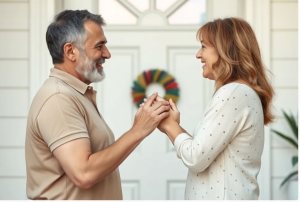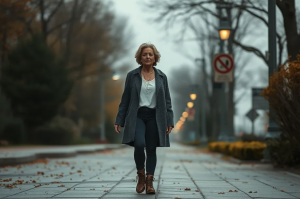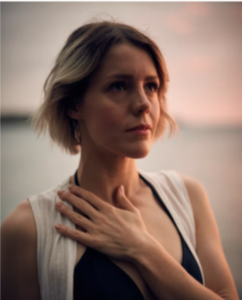Are you starting to feel anxious about the world opening up, about possibilities becoming possible again? We’re not there yet, but are you feeling a little nervous nonetheless, with maybe even a tinge of loss?
For a lot of people, this phase of the pandemic is bringing with it a new and unexpected kind of stress. The anxiety that’s bubbling up right now is not about life closing down, but paradoxically, about life opening up, and with it, the possibility of what we can and will do. It’s about “getting back out there” and what that will mean for our overall well-being.
As dreadful and devastating as this pandemic has been and continues to be, it has also brought with it a strange and unexpected sense of relief. So many people have confessed to me how relieved and thankful they’ve been over these last few months about the fact that there was nowhere to go and nothing to do. When nothing was possible, for everyone, when we couldn’t do most of what we do, what appeared, unexpectedly, was a sense of peace. So too, many people have confessed to being afraid that they will go right to living the way they did pre-pandemic, and forget all the lessons they’ve learned (and earned) through this hard time.
In our productivity-obsessed society, we feel like we have to do everything, be everywhere, see everyone; we suffer with the fear of missing out on the life we’re supposed to be living. The freedom and relief, therefore, that has come from not having to do anything (because there’s nothing to do) has been profound and life-altering. Permission to not have to be busy, productive or social, to not have to prove (to ourselves or others) that we’re living a good enough life, has offered us a much-needed break from the chronic shoulding, doing, and chasing by which we habitually live.
While change never comes in the form we wish it would, this pandemic has given (and continues to give) us a radical opportunity to step off the hamster wheel of doing, to disconnect from the relentless and mindless busyness with which we fill up our lives. With all future planning called off, this period has been a unique chance to fully arrive in this moment, now, to be present with ourselves, the people around us, nature, and everything else. We were handed an official permission slip, to award our full attention to washing the dishes, walking the dog, playing music, and making the bed, and to do so without guilt, shame, or deprivation. And maybe even, with a touch of gratitude.
When we couldn’t do any of the things we were used to doing, many of us discovered that we were quite OK, good even. We were OK doing a lot less; the things we always did suddenly didn’t seem so important or necessary. We may have realized that a lot of our doing and busyness was simply borne out of habit and conditioning, what we thought we were supposed to do, should do, or had to do. This crisis has woken us up from the anesthesia of our perpetual busyness, uprooted our pride in our busyness. Many of us have realized that we don’t want a lot of the things we thought we wanted, and don’t want to be living the way we were living before the pandemic shook us from slumber. Doing less has allowed us to experience more. Having tasted a radically different way of living, we have started asking the most important question: How do I actually want to live my life? When this is all over,we don’t have to keep living the same life we lived pre-pandemic.article continues after advertisement
During this crisis, the present moment, blessedly, felt like it was enough, no matter how simple its contents. Whatever we were doing, it was fine or at least good enough. We couldn’t make anything happen so we didn’t have to make anything happen. We were off the hook. There was no better reality out there against which to compare and denigrate our own.
But, as things start to open up in the world and it’s possible for us to start doing again, this reverence for the present moment can easily slip away. If we’re not awake, appreciation will soon become dissatisfaction again. Undoubtedly, we will start to hear those familiar and dangerous whispers that tell us we should be doing, should be busy, should be keeping up with everyone else, should be taking advantage of what’s possible, should be socializing more, should be “living” more and better. If we’re not prepared for these whispers, aware of them when they come, then we will quickly slide back into the belief that the simple things, simple moments, simple experiences are not enough and that we are not enough if that’s all we’re doing, all we’re accomplishing. And, the accompanying and perhaps most dangerous thought of all, namely, that there’s something outside of us, some experience, achievement, acquisition or place, that can make us enough, make us content, and ultimately, make us want to be where we are. We will lose our sense of peace and return to that particular brand of suffering that comes from forgetting that happiness is an inside job.
Our drive to get back to life in the world may be authentic and healthy, and yet, if we get back out there without awareness, we risk losing the profound gifts and insights from all this difficulty we’ve just endured. If we’re not mindful of our reentry into the world of doing, we’ll find ourselves back on the hamster wheel of habitual and chronic busyness and doing. Before we finish counting backwards from 10, we’ll be sleepwalking through our lives (or sleep-running), back to doing what we think we should do and have to do, mindlessly chasing after a better moment and a life that’s enough. We will have again lost touch with ourselves, with what we really want, and with a more present, grateful, and satisfying way of living.
As we re-enter the world, my hope is that we can do it with awareness and intention, and with a deep respect and appreciation for what we’ve glimpsed through this powerful and unprecedented time. Let us not forget the way it felt to bake a pie, take a walk, or play cards with our child, when that was the only place we could be, and maybe even for a moment, the only place we wanted to be. Let us not lose touch with the experience of being deeply grateful for a good conversation, a good song, or a good cup of coffee. It is up to each of us to keep fresh the experience of being fully in this now, without the chatter of what’s to come or what we should be doing always running in the background. Long after we’re back out there, our practice is to stay tethered to the sense of relief we felt when we had permission, perhaps for the first time in our lives, to not have to do all the things we think we have to do. Simultaneously, to keep in the foreground of our mind and heart the way we felt when we were off the hamster wheel. Most of all, my hope is that we continue to ask ourselves the question, “how do I really want to live?” and then design a life that’s in line with our answer.


